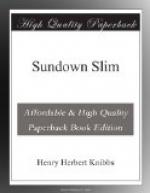Ain’t I got ears? But they don’t hear much:
Only a kind of a inside song,
Like when the grasshopper quits his sad,
And says: ‘Rickety-chick! Why, there is nothin’ wrong!’
And after the coffee, things ain’t so bad.”
“Huh! Sounds all right for a starter. Ladies and them as came with you, I will now spiel the next section.”
“The wind is makin’ my bed
for me,
Smoothin’ the grass
where I’m goin’ to flop,
When the quails roost up in the live-oak
tree,
And my legs feel like as they
want to stop.
Pal or no pal, it’s about the same,
For nobody knows how you feel
inside.
Hittin’ the grit is a lonesome game,—
But quit it? No matter
how hard I tried.
But mebby I will when that inside song
Stops a-buzzin’ like
bees that’s mad,
Grumblin’ together: ‘There’s
nothin’ wrong!’
And—after the coffee
things ain’t so bad.”
“Bees ain’t so darned happy, either. They’re too busy. Guess it’s a good thing I went back to me grasshopper in the last verse. And now, ladies and gents, this is posituvely the last appearance of the noted electrocutionist, Sundown Slim; so, listen.”
“Ladies, I’ve beat it from
Los to Maine.
And, gents, not knowin’
jest what to do,
I turned and slippered it back again,
Wantin’ to see, jest
the same as you.
Ridin’ rods and a-dodgin’
flies;
Eatin’ at times when
me luck was good.
Spielin’ the con to the easy guys,
But never jest makin’
it understood,
Even to me, why that inside song
Kep’ a-handin’
me out the glad,
Like the grasshopper singin’:
‘There’s nothin’ wrong!’
And—after the coffee
things ain’t so bad.”
Sundown grinned with unalloyed pleasure. His mythical audience seemed to await a few words, so he rose stiffly, and struck an attitude somewhat akin to that of Henry Irving standing beside a milk-can and contemplating the village pump. “It gives me great pleasure to inform you”—he hesitated and cleared his throat—“that them there words of mine was expired by half a rabbit—small—and two cans of coffee. Had I been fed up like youse”—and he bowed grandly—“there’s no tellin’ what I might ‘a’ writ. Thankin’ you for the box-office receipts, I am yours to demand, Sundown Slim, of Outdoors, Anywhere, till further notice.”
Then he marched histrionically to the ranchhouse and made a fire in the rusted stove.
CHAPTER III
THIRTY MILES TO THE CONCHO
John Corliss rode up to the water-hole, dismounted, and pushed through the gate. His horse “Chinook” watched him with gently inquisitive eyes. Chinook was not accustomed to inattention when he was thirsty. He had covered the thirty miles from the Concho Ranch in five long, dry, and dusty hours. He nickered. “In a minute,” said Corliss. Then he knocked at the ranch-house door. Riders of the Concho usually strode jingling into the ranch-house without formality. Corliss, however, had been gazing at the lean stovepipe for hours before he finally decided that there was smoke rising from it. He knocked a second time.




